|
Modern discoveries in the art of
steel making are ranked by the industrial historian as
the most important of the latter half of this century,
and, in all probability, should be considered the most
important in the modern industrial period. Steel is now
the prime requisite of the engineer, and is in universal
use, and has, in many departments of engineering,
entirely supplanted iron. Hence, the manufacture of
steel castings has assumed an importance, which has,
naturally enough, led many firms of large resources to
turn their attention to it; but, while some of these
have secured more or less reputation and success, it
must be admitted that the firms which have received
eminence in this field of industry, are few and far
between, and not difficult to enumerate. While trade was
depressed, this was not felt so much, but now, when
things are so different, the difficulty of getting
orders executed is severely felt as somewhat of a
handicap in the industrial race.
Among the firms of steel founders
whose resources are the back-bone of the mere important
departments of engineering, Messrs. F. H. Lloyd & Co.,
Ltd., Wednesbury, occupy one of the foremost places. To this firm, we notice with pleasure, has been
entrusted the making of many of the castings used in the
construction of Her Majesty's new Royal yacht, a pretty
sure indication that they enjoy the confidence of
engineering circles in a special degree, and a well
merited tribute to their reputation in the department
they have made their own. |
|
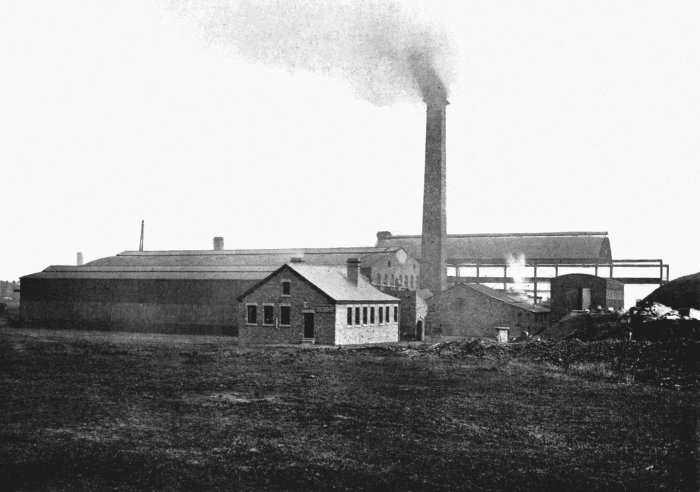
Part of the works. |
|
The business of this company was
founded 20 years ago by the present chairman, Mr. F. H.
Lloyd, for the production of steel castings and special
qualities of ingots. The development of basic steel
making in the district led to a modification of the
original scope of the enterprise, and, very fortunately
as it has turned out, led Mr. Lloyd to concentrate his
whole attention on steel casting. Some eleven years
back, when the growth of development of the business
made it advisable, it was turned into a limited company,
and its steady expansion since then has been remarkable;
Mr. Lloyd, taking a great interest in the business as
chairman, assisted by a strong directorate, consisting
of the managing director, Mr. J. Hemming, Mr. S. J.
Lloyd, and Mr. J. Fellows.
Turning now to the James Bridge
Steel Works, we may say they form, practically, the only
establishment of the kind outside Sheffield, within a
radius of 60 or 70-miles from Wednesbury, for though
several midland firms have tried their hand at steel
casting, their success has not been conspicuous. |
|
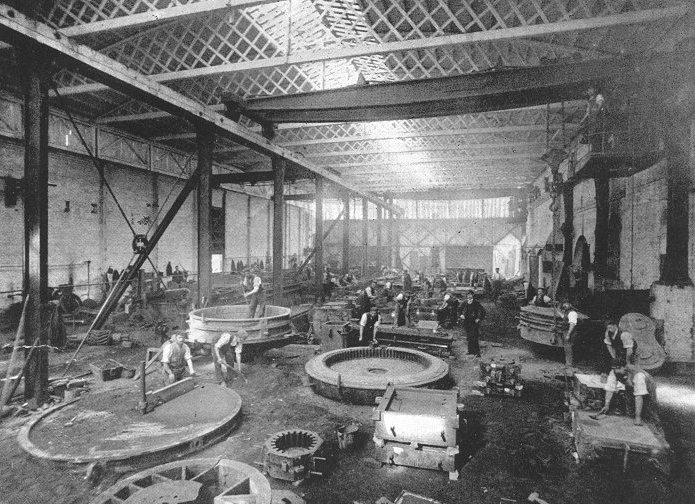
The Heavy Foundry. |
| The works are on a large scale, the property
consisting of over eleven acres of ground, and extending
from the valuable frontage on the Walsall Road right
through to the London & North Western Railway, from
which private sidings run into the main buildings, the
trucks coming into the various shops.
A handsome detached building has recently been
erected for the accommodation of the directorate and
managers, the commercial staff and the draughtsmen, and
including also the chemical laboratory, one of the most
important adjuncts of a modern steel foundry.
The foundry proper is on a big scale, having a floor
space of between 17,000 and 18,000 feet, the whole of
which is commanded by lifting appliances of various
types. The melting plant consists of three 10 ton
Siemens-Martin furnaces, and a small crucible furnace,
the larger furnaces being served by an electric crane
for charging and tapping. These furnaces, together with
the stoves and drying annealing furnaces, are all heated
by gas made on the premises by Wilson Producers. |
|
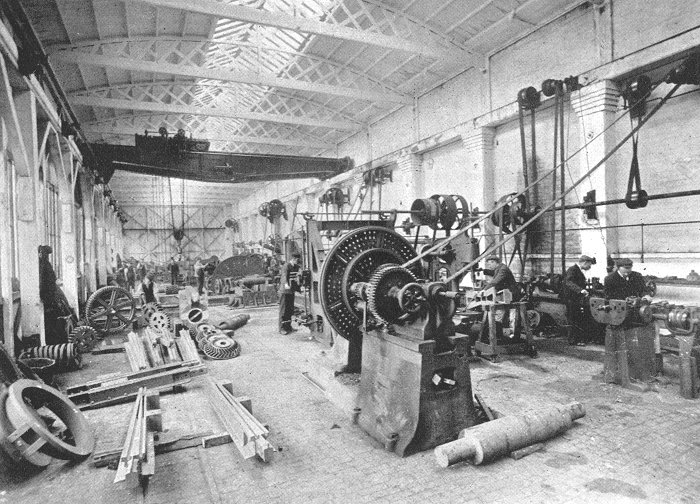
The Machine Shop. |
| Quite an army of workmen is employed in the foundry,
and the busy scene, impressive enough at any time, is
more than Rembrandtesque of an evening, when the place
is lit up suddenly with the flash of molten metal. Our
next visit was to a big fitting and turning shop,
equipped with the best and most powerful modern
appliances for finishing castings requiring machining.
Here we saw a number of big steel rolls, finished and
ready for despatch, these being one of the leading items
on the firm's list. The pattern shop is of a size in
keeping with the rest of the establishment, and is
replete with splendid machinery for the rapid and
economical production of the patterns necessary in the
business. |
|
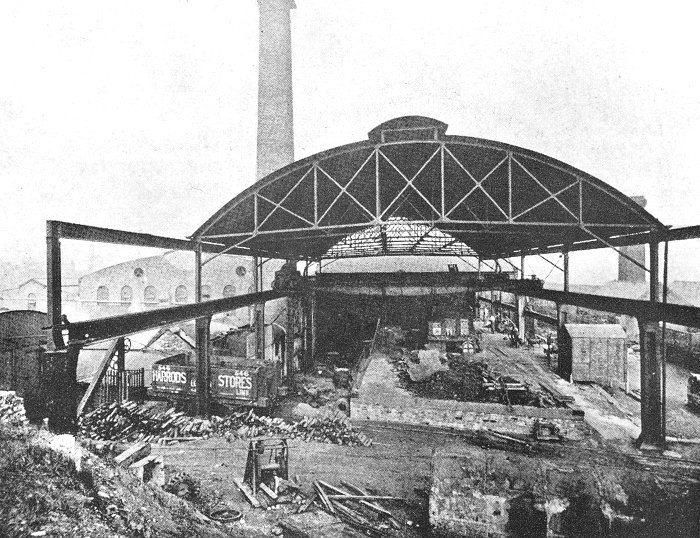
The Melting Shop. |
| A very large staff of expert pattern makers is busy
here. In this shop and in three other stores, the
company keep an immense stock of patterns for repeat
orders, and take great pride in the fact that they are
so methodically arranged and booked, that any pattern
wanted can be brought to light in a minute.
There are many subsidiary shops and stores, and a
great yard commanded by a powerful steam derrick, useful
for the storage of casting boxes, and the testing of
castings. The motive power is derived from vertical
compound condensing engines of the most modern type.
About 200 to 300 workmen are employed, many of whom have
been with the firm since the commencement.
Messrs. F.
H. Lloyd & Co., Ltd., can turn out any description and
size of steel castings up to 6 or 7 tons, and are makers
for the British Admiralty, for British and foreign
railways and tramways, and for engineering firms of
nearly every description, collieries, etc. |
|
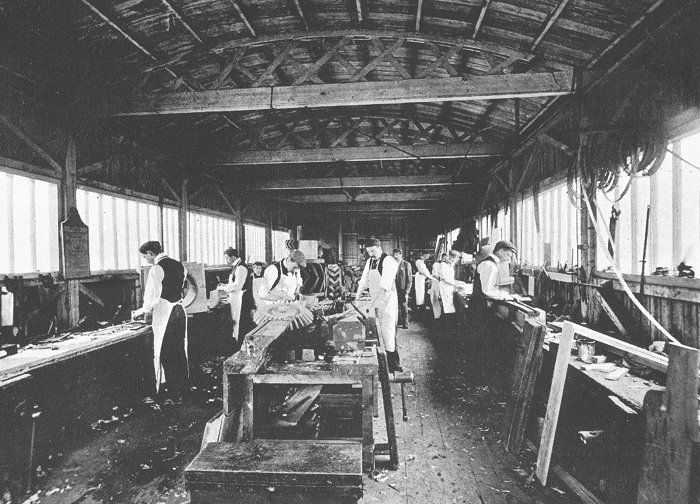
The Pattern Shop. |
|
Among their specialities are machine-moulded wheels
made on the most modern system and finished by special
machinery, points, crossings, and other tramway patents
and equipments; patent and other anchors for the
merchant and naval service; ship and engine casting;
hydraulic castings of any description.
But, in fact, everything in the
shape of steel castings, small or large, is executed by
the firm, whose output is of the most varied and
comprehensive description. Indeed, one of the orders we
saw in course of construction were several large spur
wheels, about l0ft. and 12ft. in diameter.
Needless to say, the company are
working at high pressure, and under the guidance of the
experienced directorate, their business is going ahead,
as Mr. Gladstone phrased it, "by leaps and bounds." |
|
 |
|
Return to the
previous page |
|